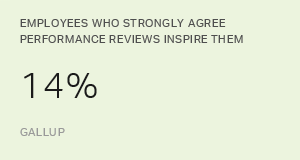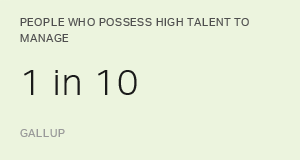A lot of managers wrestle with this question. Workers who are a part of the current and upcoming generations are asking for something different. They want something more. Now more than ever, people want a great job. We can help.
Listen to Jim Harter, coauthor of It's the Manager and Gallup Chief Workplace Scientist, discuss what employees look for in a job, the importance of you to your company's success, and why It's the Manager will be your best resource to become the leader you want to be.
From the Video:
So, there's a new will of the current workplace where workers in this current generation are asking for something different. They're more aware today about what a great job can be. That could be due to the increase in technology and awareness. But they want something more than what a job has been in the past. They want a job to be blended, they know that their work is going to be blended into their life, and they want, they want work that defines their purpose. Not just a job, but their purpose. They're looking for a job that has a coach, not just a boss. They don't want to settle for a boss that just is an expert on their weaknesses, they want someone who focuses on their strengths. This new workplace is looking for not just an annual review, but continuous conversations. They don't want to just be satisfied with their work, they want to develop. And so we have a new workforce coming into play now that is looking for something much different than what previous generations have looked for in work. And they prioritize work at a different level.
Right now, organizations are changing at a very rapid rate. Most organizations want to be agile, but most aren't. And to become agile, organizations need more effective managers, on top of everything else, because managers are the conduit to making all the strategy happen, to making culture happen in the organization.
In It's the Manager, we review a number of areas. One of them is the kinds of conversations the best managers in the world have. One of the biggest missing components in most organizations is, and it might be surprising to many, is that most managers don't have continuous productive conversations with their employees. They don't have conversations on a daily, weekly, monthly basis that are meaningful to the people that they work with directly every day. They wait for the annual review to share how someone's doing. So, It's the Manager exposes, through the research and the science, the types of conversations that managers have on a continuous basis that make everything else go a lot better in organizations. What's in it for managers is that they can learn from this book how they can build and support the culture their organization is after and actually make their jobs easier. So, we list a lot of things managers can do, a lot of activities and elements that managers can work on. But what these elements do is they actually make a manager's job more efficient and easier and allow them to utilize their inherent strengths as opposed to trying to become someone that they're not.
Some of our discoveries in this book are immediately applicable to any manager at any state. So, some managers are struggling with just how to manage people. People are messy. People are difficult to manage because they all come with their own stories and their own baggage, to some extent. They also come with their own strengths, though. And so, I think what can help managers here is to build a path that's more efficient for them in terms of how they deal with people. How do they set expectations effectively? How do they align with the strategy of the organization and convey that to their employees in a way that is easy for them to understand and immediately applicable?
It's a book with 52 short chapters that can each be read in probably about five to 10 minutes and then have a meeting with your team. And so, the key with utilizing this book effectively is to find the topic or topics that are most relevant to the issues facing your team, have your team read those chapters, very quickly, have a meeting with them, and discuss those issues and think about how you move forward.



